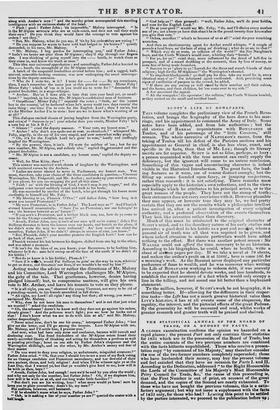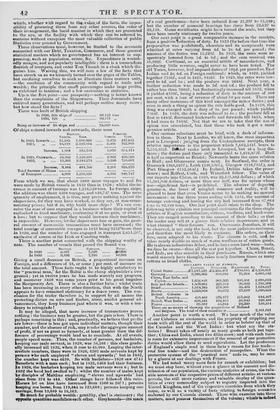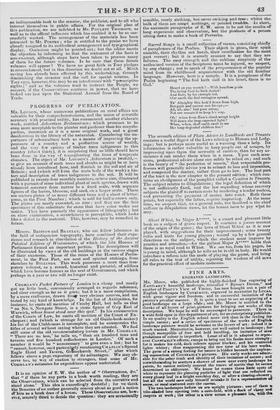THE STATISTICAL ANNUAL OF THE BOARD OF TRADE, OR A
BUDGET OF FACTS.
A CLOSER examination confirms the opinion we hazarded on a rapid glance : the present Part not only contains those statistics for 1833 which are in the possession of the Board of Trade, but the entire contents of the two previous numbers are combined with the facts hitherto unpublished. Those who receive a presen- tation copy "by command of his Majesty," may therefore consider the use of the two former numbers completely superseded; those who have husbanded their money, may buy the present volume and feel satisfied that they have no Occasion for Parts I. and IL According to the Dedication, addressed "to the Right Honourable the Lords of the Committee of his Majesty's Most Honourable Privy- Council for Trade, &c," the cause of this proceeding is, that the First Number is out of print, on account of the great demand, and the copies of the Second are nearly exhausted. To those who have not bought the previous volumes, this is a satis- factory argument; but why not issue a supplement with the feats of 1833 only, for those who had? Leaving this point to be Wiled by the parties interested, we proceed to the publication before IV ;
which, whether with regard to thg,ealue.of the facts, the impos- sibility of procuring them from any other sources, the order of their arrangement, the lucid manlier in which they are presented to the eye, or the facility with which they can be referred to, contains without exception the most valuable collection of public Statistics ever printed by Government.
These observations must, however, be limited to the accounts connected with our Debt, Taxation, Commerce, and those general statistical matters which no governroent has an interest- in sup- pressing, such as population. crime, &c. Expenditure is wretch- edly meagre, and not popularly intelligible : there is a tremendous flourish of trumpets, and enter Tom Thumb in a cloak which dis- guises him. Waiving this, we will note a few of the facts that have struck us as we leisurely turned over the pages of the Tables, but confining ourselves to such as illustrate three matters only, -the condition of the community with regard to trade and wealth; the principle that midi percentages make large profits, as exhibited in taxation; and a few curiosities in statistics.
• Upun the first point-our prosperity-nothing is better known than the complaints of the Shipowners. Their Jeremiads have outlived many generations, and will perhaps outlive many more ; but how stand the facts ?
There was built of British shipping
In 1820, 635 ships of 68,142 tons
1833, 728 „ 92,171 „ Being an increase of 93 ships, and 24,029 tons.
Of ships entered inwards and outwards, there were
Vessels. Tons. Foamom.
Vessels. Tuns.
In 1820, Inwards .... 11,285 1,668,060 3,472 447,611
183t, St ••••
13,119 2,183,814 5,505 762,065 Increase, 1,834 515,754 1,033 314,474
In 1820, Outwards...
10,102 1,549,508 2,969 403,328 1833, ,, 13,266 2,244,274 5,260 758,601 Increase, 3,164 694,766 2,281 325,273 Total Increase of Means --
4,998 1,210,520 4,334 840,747 of Transport
From which we see, that about 5000 more voyages to and fro were made by British vessels in 1833 than in 1820; whilst the in- crease in amount of tonnage was 1,2 1 0,5 2 0 tons. In foreign ships, the addition was about 4300 voyages, and 840,747 tons. The mere quantity of employment, it is true, may prove nothing against the shipowners, for they may have worked, as they say, at non-remu- nerating prices; but if so, why build more ships We can con- ceive the ease of men engaged in a business where their capital is embarked in fixed machinery, continuing it at no gain, or even at a loss; but to suppose that they would increase their machinery, is impossible. However, let the shipowners lose or gain, the gene- ral amount of mercantile transactions must have increased; the total numlar of mercantile voyages in 1833 being 9332•More than in 1820, and the number of tons engaged in transport 2,051,267, exclusive of course of the Irish or Coasting trade.
There is another point connected with the shipping worthy of note. The number of vessels that passed the Sound was
FOREIGN. TOT• I..
In 1820 3,597 7,329
11ri In 1833 3,192 7,793 11°O
Giving a small decrease on British, a proportional increase on Foreign, and a difference of 59, or some per cent. of increase on the total amount. These facts ought to be highly satisfactory to the "practical man," for the Baltic is the cheap shipbuilder's own ground ; yet in twelve years he has made scarcely any progress, and moreover 1820 was some years prior to his great bugaboo the Reciprocity Act. There is also a further balm : whilst trade has been increasing in every other direction, that with the North appears to have remained stationary for a doaen years. The con- clusion for tile trader therefore is, to support by all means the protecting-duties on corn and timber, since, amidst general ad- vancement, they keep business just where it was, or with a ten- dency to retrograde !
It may be alleged, that mere increase of transactions proves
nothing : the business may be greater, but the gain is less. There is perhaps something in this; and, practically, we believe that profits are lower-there is less got upon individual matters, though their number, and the absence of risk, may render the aggregate amount of profit, if not as great as formerly, at least greater than the dif- ference of percentage would lead us to conclude. At all events, people spend more. Thus, the number of persons, not bachelors, keeping one male servant, in 1820, was 34,266 : this class gradu- ally increased till 1832, when it rose to 45,909. Leaping the inter- mediate numbers, there were in 1920, 4202 male servants kept by persons who each employed "eleven and upwards ;" but in 1832, the number kept was 4639. So with bachelors-1820 saw 4745 Benedict') with a man each ; but in 1832, 6468 had their footmen. In 1820, the bachelors keeping ten male servants were 6; but in 1832 the band had swelled to 7; whilst the number of males kept by disciples of Malthus employing "eleven and upwards" bad risen from 374 to 444. Other things have followed this ratio. Horses let on hire have increased from 1500 to 2073; persons keeping one horse, from 119,444 to 123,668; persons keeping one
carriage, from 13,689 to 18,163.
So much for probable wealth : gentility, alas! is stationary; the opposite quantities annihilate each other. Greyhounds-the mark of a real gentleman-have been reduced from 21,297 to 15,840; but the number of armorial bearings has risen from 22,627 to 29,139. Game certificates might hare turned the scale, but they have been nearly stationary for twelve years. Our next poipt is a great comparative increase in the receipts, from a posit iveifeduction of duty. In 1823 (for before that time the preparation was prohibited), chocolate and its compounds were admitted at rates varying from 4d. to 2s. 6d per pound; the amount of the duties was 15,521/. In 1832, the rates were re. speetively lowered from Id. to 6d.; and the sum received was 16,902/. Cochineal, as an essential article of manufacture, and producing little revenue, ought never to have been taxed. The old Tories, however, had imposed duties of 10id. per pound on East Indian and 2s. 6d. on Foreign cochineal; which, in 1820, yielded together 75951., and in 1821, 9426/. In 1825, the rates were low- ered to 9d. and Is.; and the produce was 9448/. Next year, a further reduction was made to 2d. and 6d.; the produce fell to rather less than 3000/., but fluctuatingly increased till 1832, when it yielded 43391., being a reduction of duty to the amciunt of 500 per cent. with a loss of revenue of about 50 per cent. There are many other instances of this kind amongst the minor duties; and even in such a thing as opium the rule holds good. In 1 8 2 0, this drug was charged with a duty of 9s. per pound ; which yielded 73601. In 1 8 2 8, the duty was reduced to 4s.; the produce fell at first to 6483/. fluctuated backwards and forwards till 1833, when it had risen to 70881. Not that we are to infer that the use or opium was stimulated, but that those who took it got a more ' genuine article. Our curious selections must be brief, with a dash of informa- tion in them. Next to London, we all know, the most important port is Liverpool : judging from the Customhouse receipts, their relative importance is the proportion which 7,662,521/. bears to 3,5.55,955/. BAtol ranks next to Liverpool, but at a loae" dis- tance; the duties paid there only amounted to 1,016,873/. Hull is half as important as Bristol; Newcastle bears the same relation to hull; and Gloucester comes next. In Scotland, the order is Greenock (383,927/4, Leith (246,5361,), Glasgow (159,795/4, and - Port Glasgow (152,564/4 In Ireland, Dublin takes the prece- dence; and Belfast, Cork, and Waterford follow. The value of our imports into China, in 1 S 3 3, was 22,135,802 dollars ; of which 11,381,930 dollars, or more than one half, was for opium whose use-significant fact-is prohibited. The admirer of departe# greatness, the lover of mingled romance and reality, will be pleased to hear that even Venice seems to • be making an onward movement : in the three years ending with 1831, the amount of tonnage entering and leaving the city had increased from 67,003 tons to 92,100 tons. Our last point shall relate to the shop. The
following table exhibits our principal customers for the three staple articles of Engliall manufacture, cottons, woollens, and hard-ware. They are ranged according to the amount of their bills; so that the reader may tell at a glance their relative importance, and in what channel " their favours' run. Our cousin Jonathan, it will be observed, is not only the best, but the most judicious customer, and therefore the most likely to continue. His orders, on their face, seem adapted to his want& The climate is cold, and he takes nearly double as much of warm woollens as of cotton goods. He is also an industrious fellow, and he buys more hard-ware-tools, we dare be sworn-than all the rest put together. China, Brazil, and Italy, are also sensible in their purchases. Russia, which one would scarcely have thought, takes nearly fourteen times as many
cottons as broad cloths. •
DECL A RED VALUE OF EXPORTS.
COTTON,. WOoLLENs. 1IAUDWATL. Re. ToTAL.
£4,250,951 4,006,542 2,698,013 1,796,205 1,624,827 1,380,655 944,407 , 820,488 150,514.
There are no means of showing the proportions of Holland
and Belgium. The total of these countries is 2,161,021
Another point is worth a word. We hear much of the value of our Colonies as customers, and the propriety of crippling our trade with all the rest of the world in order to bolster up that of the Canadas and the West Indies : but what say the sta- tistics? Brazil takes off nearly as many goods as both put toge- ther; China and India, about two fifths more; and with each there is room for extensive improvement if the removal of our protective duties would allow them to send equivalents. Let the producers of England's staple read in these facts a reason for free trade- real free trade-and the destruction of monopolies. What the protective system of the "practical men" ends in, may be seen by a glance at our dealings with France. We had noted many more facts for remark or exhibition; but we must stop here, without even a glance at the amount and dis- tribution of our population, the curious statistics of crime, the valu- able accounts of the respective prices of different articles at various periods, the still more curious and valuable display of the quan- tities of every commodity subject to registry imported into. the United Kingdom, and of the respective countries from which they come, as mall as a variety of facts relating to foreign countries collected by our Consuls abroad. Those who examine into these matters, must possess themselves of the volume; whiehria indeed.
united States £1,247,529 £2,265,407 .£738,015 Germany 3,296,362 634,916 75,264 China, East India, and
Ceylon.. 1,632,849 961,333 103,831 Italy and the Islands 1,509,661 220,512 36,032 Brazil 1,314,765 274,568 Z35,494 Russia 1,259,964 93,072 27,619 British Colonies in
North America 450,468 376,677 117,062
Etitish West Indies
659,445 102,100 58,943 France 66,310 55,944 28,260
an indispensable book to the senator, the publicist, and to all who interest themselves in public affairs. For the original plan of this publication, we are indebted to Mr. Poutterr THOMSON, as well as to the official influence which has enabled it to be so suc- cessfully worked. The arrangement of the materials has been intrusted to Mr. PORTER; who is entitled to the praise we have already assigned to its methodical arrangement and typographical display. Omissions might be pointed out; but the editor meets the objection by informing us that the statement of the facts is non-existent, although steps have been taken to procure many -of them for the future volumes. Is he sure that these future volumes will appear ? We have no great faith in Tory pledges to retrenchment, but in this direction we doubt not at all. Much saving has already been effected by this undertaking, through
• diminishing the occasion and the call for special returns. In Tory eyes, however, this may be an inteiference with "prescriptive rights ;". and as the volumes tend to instruct the People, we suspect, if the Conservatives continue in power, that we have looked our last upon the Statistical Annual from the Board of Trade.




























 Previous page
Previous page